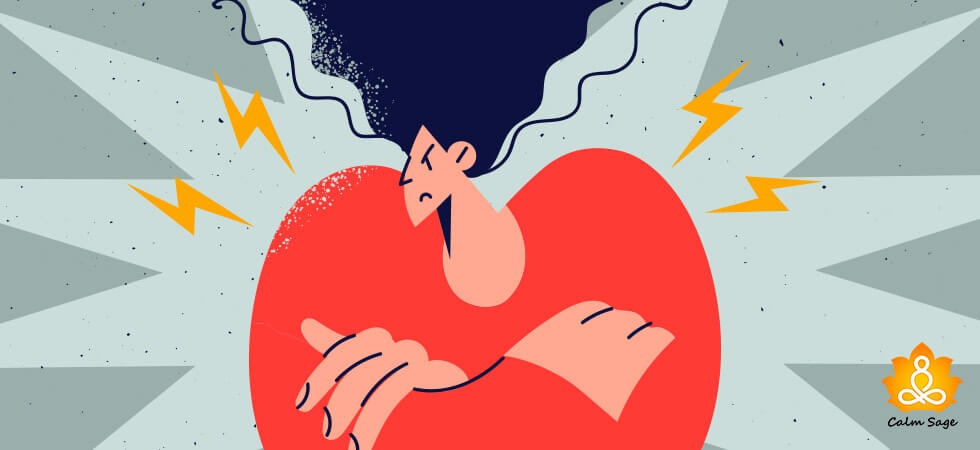The Science Behind Situational Anger And How to Master It

Anger is a universal emotion experienced by all and from time to time so I don’t think no one’s a stranger to anger. When something doesn’t seem to go your way, then anger becomes a natural response. In certain situations, anger can be healthy, especially when it’s managed properly. One specific type of anger that many of us experience is situational anger.
Maybe the bus ride back home from work got delayed, or your laptop started acting up just when you needed to complete that presentation. I’ve had my fair share of such experiences and I’m sure you have too, so when anger pops up in such situations, nobody can blame you.
This is what situational anger is. Situational anger is like a temporary storm of strong, unhappy feelings that arise when something specific makes you upset, aggrieved, or frustrated in the moment. But, is that all there is to situational anger? Or is this type of anger a sign of something big?
Let’s find out in this blog what is situational anger, how to recognize its signs, and most importantly, how can you cope with it constructively and healthily.
What is Situational Anger?

Situational anger is the type of anger that arises in response to specific situations or specific triggers. It’s not a chronic state of anger, but a temporary emotional reaction to something that happened which left you feeling afoot. Situational anger can differ in its intensity and duration and often comes from feeling frustrated, overwhelmed, or threatened in any way – emotional or mental.
So, do you struggle with situational anger? I have some common triggers or examples of situational anger. Read them and see if it’s something you can relate to;
- Getting stuck in a long traffic jam on your way to an important appointment can trigger situational anger due to the frustration and helplessness of the situation
- Getting into a heated argument with a loved one can lead to situational anger due to feeling overwhelmed
- Being unfairly treated at work or dealing with a stubborn coworker can also trigger situational anger
- When your favorite sports team loses a game, it can also cause situational anger, especially if you are emotionally invested in the team
- When your computer crashes, your phone freezes, or your internet connection fails while you’re working, you can also experience situational anger
- Meeting unexpected expenses or financial setbacks, such as being in debt, can cause situational anger due to the added stress
- When plans are changed or canceled, especially something you’ve been looking forward to, then such situations can elicit situational anger as well
How to Spot Signs of Situational Anger

If situational anger is something you can relate to, then here are some common signs of situational anger that you need to watch out for;
- Increased heart rate
- Muscle tension or stiffness
- Feeling irritable
- Shouting, yelling, or saying mean things in the heat of the moment
- Aggressive behaviors
- Acting impulsively without thinking about the consequences of your actions
- Making hasty decisions
While these are some of the most common physical and emotional manifestations of situational anger, how these signs manifest can vary from person to person. Situational anger, as it says, is something that stems from a specific situation so it can be triggered by various circumstances. Some common causes of situational anger may include;
- Getting into conflicts or disagreements with others
- Being unable to move forward in life despite trying your best
- Experiencing high levels of stress such as financial stress, work stress, or more
- Witnessing injustice or unfair treatment and being unable to do anything
Accumulated Rage vs. Situational Rage
Accumulated rage is the big ol’ pile of hidden anger that builds over time. It’s when you hold onto your anger and the feelings that come with it without addressing them or dealing with them. This type of pent-up anger can get stronger and more intense over time and can explode at the most unexpected of times.
Situational anger, on the other hand, is the type of anger that occurs when a specific situation triggers feelings of anger and frustration. Situational anger can make you angry in the moment.
While accumulated rage can develop over weeks, months, and years, situational anger can occur suddenly and immediately. Accumulated anger is intense because you hold in your anger for a long time, but situational anger’s intensity can depend on specific triggers and your emotional response in the moment.
If you deal with accumulated rage, then you tend to keep all the feelings of anger inside, avoiding talking about it and avoiding expressing your feelings. Whereas, if you’re dealing with situational rage, then you express your response outwardly and can show visible reactions such as shouting, yelling, and frustration.
Accumulated rage, when kept unchecked, can leave long-term negative effects on your mental as well as physical health, even relationships. While situational anger can impact relationships, it has short-term effects and is easier to manage compared to accumulated rage.
So, How Can You Cope With Situational Anger?

Now that you understand what is situational anger and what might cause it, I have some healthy strategies for you to try to control anger immediately;
1.Practice deep breathing
When you feel your anger building, take slow and deliberate breaths. This practice can help you calm down your anger response and give you a moment to think before you react. You can try controlled breathing practices such as 4-7-8 breathing exercises, square breathing, or conscious breathing.
2.Walk away, if you can
Another way to control your anger is to remove yourself from the situation that is triggering your anger. Take a short walk or step out of the room for a moment to cool down. This will help you think rationally and not blindly react to the triggering situation.
3.Practice relaxation techniques
You can also engage in relaxation techniques such as meditation, mindfulness, yoga, or progressive muscle relaxation to reduce your stress levels and calm down. These relaxation techniques can help cool your heightened emotions and cool off.
4.Seek support for anger management
You can also talk to a trusted friend or family member, even a therapist about your anger issues. Having a support system to talk to can help you get valuable perspective and support, especially if your anger issues interfere with your life and relationships.
5.Give yourself time-outs
If you’re in a situation where your anger might ruin things, then take a time out. You can also call for a time-out to calm yourself and the situation down. Take the discussion again when you’ve calmed down and there’s a limited risk of your anger being triggered.
Wrapping Up…
Situational anger is a common and natural emotional response to specific triggers in our lives and relationships. Understanding the signs of situational anger and what might trigger it can help you effectively manage and control your anger. You can try the above-mentioned coping strategies like deep breathing, taking breaks, and even seeking help for anger management to master situational anger and improve your health.
Keep in mind that there’s nothing wrong with feeling anger, but how you respond to anger matters more.
I hope this blog will help you learn more about situational anger and how to control your anger. Let me know what you think about the tips I mentioned in this article to master situational anger in the comments below.
Take Care!




















